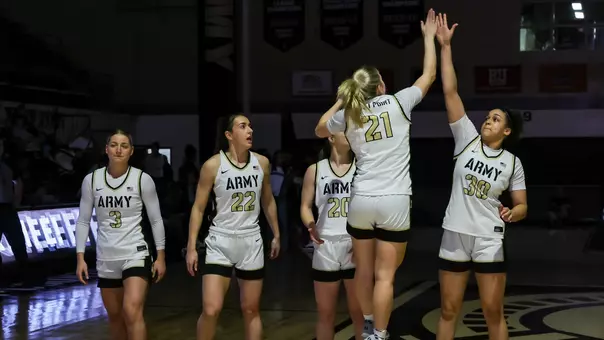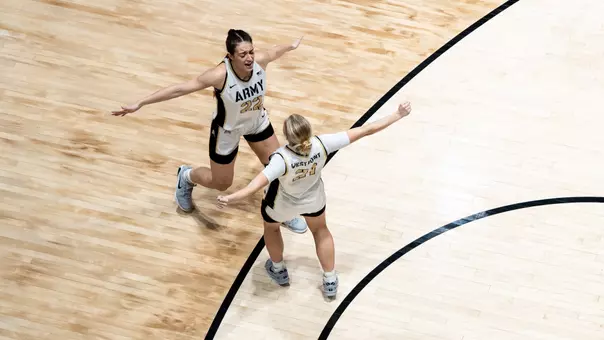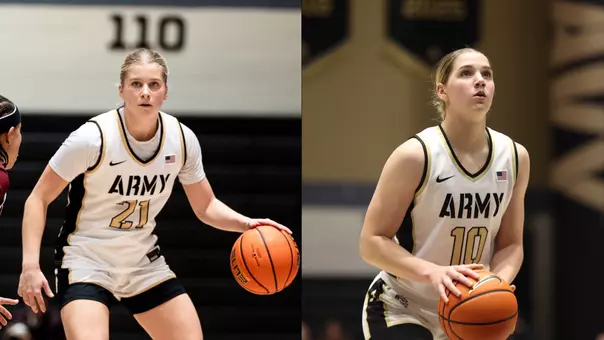Army West Point Athletics

Feature Friday: Two of a Kind
February 23, 2017 | Women's Basketball
Feature Friday highlights the tremendous personal stories our coaches and cadet-athletes have to share on a weekly basis. Each Friday, a new feature story will be prominently highlighted on GoArmyWestPoint.com. The features will include multimedia pieces, as well as written stories by media outlets and the Army West Point athletic communications staff.
Daizjah Morris and Destinee Morris have played on the same basketball teams for as long as they can remember. After picking up the sport in fourth grade, the Morris sisters have shared the same backcourt for over a decade, all the way to presently competing as juniors on the Army West Point women's basketball team.
Daizjah and Destinee grew up in a military family, with their father serving in the Air Force for seven years. The identical twins were born at Grand Forks Air Force Base in North Dakota and lived in the state until their family moved to Lino Lakes, Minn., when they were in eighth grade.
From their first basketball memories, the twins remember learning the basics together, with help from their father, Jeremy.
"One of the earliest memories I have from when we first started playing is being out by this court near where we used to live and my dad was trying to teach both of us how to shoot a layup," Daizjah said.
"We would play games and we were usually faster than all of the other girls," Destinee shared. "We would be on a fast break and we would always miss our layups. There would be multiple times in a game when we would both be on the other side of the court because we were way ahead of everyone else, and I'd miss a layup and she'd get the rebound and then she would miss a layup and it would go back-and-forth until one of us made it."
After learning the game, it didn't take long for the twins to start developing their individual abilities and begin to discover their niche in the sport.
Daizjah, the slightly older of the two, settled into her role as a slashing guard who could beat opponents driving to the hoop, while Destinee excelled as a three-point shooter. Both sisters took pride in defense and found that their speed helped them strive in that area.
"Offensively, what makes us have a different style is that Daizjah likes to attack the basket more and I've always been more of the shooter," Destinee said. "It's been like that as long as I can remember. The drive-and-kicks are always there between us."

Jeremy remembers watching the two come into their own during separate moments of a game in their elementary school days.
"They may have been in fifth or sixth grade, and this was when kids would come over and talk to their parents in the stands at halftime," Jeremy said. "Destinee came up to the stands and she said 'dad, can I shoot a three-pointer?' And I said 'yeah if you're open, do what you need to do.' And sure enough, in the second half, she threw up this long three-pointer and it went in and she had the biggest grin on her face.
"And in that same game, Daizjah drove to the basket and she crossed this girl over and the girl fell down. And that's kind of how it's always been, Destinee is more of the shooter and Daizjah was always more of the slasher."
From the time they started playing basketball competitively, Daizjah and Destinee had their sights set on taking their game to the next step -- college.
"When we first started playing in fourth grade, my dad asked what our basketball goals were and I said, 'I want to play Division I basketball,'" Daizjah remembered. "And my dad said, 'Alright.' He never doubted us once, he never said that's not possible. That's when we both set in our minds that that was going to be our goal."
From that moment on, the dynamic duo knew that they would need to put in the work to show they were capable of eventually achieving that goal.
 Jeremy, and his wife, Bernice, knew playing Division I college basketball wouldn't be a given, but wanted to give their daughters the tools they would need to pursue the dream of playing collegiately.
Jeremy, and his wife, Bernice, knew playing Division I college basketball wouldn't be a given, but wanted to give their daughters the tools they would need to pursue the dream of playing collegiately.
"From an early age, they knew that basketball was going to be a part of them and take them into their future," Bernice said. "They knew basketball might not be their life, but they knew it was their gateway. We always told them they didn't have to stick with basketball if it wasn't their passion, but they stayed with it."
The Morris twins first received the attention of college coaches by November of their junior year of high school, when colleges are first permitted to email high school players.
Daizjah and Destinee knew they wanted to play at the Division I level in fourth grade, and that dream was starting to become a reality after their inboxes were filled with coaches who wanted the twins at their school.
And so began the recruiting process.
"From the very beginning, we both knew that we were going to play together," Daizjah said. "At no point did we ever think that we would go on our separate ways and play at different colleges. It's always been a joint decision."
Army wasn't the first Division I program to reach out the Morris twins, and when the recruiting letter from West Point finally came, there were question marks concerning what the United States Military Academy was.
When the two learned that West Point was in fact a military academy, they were initially unsure about seriously considering the school. But a phone conversation with a coach from another school later that day helped lead them into giving Army a second look.
"It was kind of a coincidence that night after we received the letter from West Point, we were talking to another Division I coach and he was telling us, 'I want to give you some tips on recruiting, one thing I'll tell you is never count a school out during your recruiting process,'" Destinee remembered. "And we knew we had to look into West Point, even though it wasn't what we initially wanted."

The decision to attend West Point was ultimately reached after the sisters made their recruiting visit to the Academy and were impressed with the unique offerings the school could provide that other colleges simply didn't have.
"Before the recruiting process, we knew that no matter what school we picked, we were going to pick it for academics first, and then basketball would come second," Destinee said. "Obviously, West Point has amazing academics and just the idea of being able to serve your country and do something greater really enticed us to do more with our lives. It was an easy decision."
After getting in and completing basic training, the Morris' learned to manage their time with academics, military requirements and basketball activities early in their plebe year. They began to realize competing in a sport at West Point was different than doing so at the majority of other colleges around the nation.
"I've played with a lot of girls over the years, and I've talked with them about the dynamic of their teams, and no one has voiced the fact that their team is as close as we are," Daizjah said. "The things that we go through on a daily basis, getting up for formation at 6:30 a.m., all of that stuff, sharing those struggles brings us closer. The bonds that we make together, not just as teammates, but really as sisters, I don't think I would get that at another school."
Daizjah and Destinee have each played in over 70 games during their three seasons on the Army women's basketball squad, and have both established reputations as shutdown defenders.
Destinee, the shooter, is Army's top three-pointer threat this year with just under a pair of three-pointers per game, while Daizjah, the slashing guard, has seen nearly 70 percent of her scoring this season come from inside the three-point arc and leads the Black Knights with 2.14 steals per contest.
Daizjah and Destinee set out to become Division I college basketball players in fourth grade and succeeded in that goal. They have always competed side by side since first playing organized basketball and wouldn't have had it any other way.
"Not having her here would be completely different for me," Daizjah said at the thought of being at West Point without her sister. "Destinee has been with me forever, we've always roomed together, so even coming to West Point and rooming apart was kind of weird. I would feel like I was missing a limb if she wasn't here. Minnesota is really far away and having her here is like having a piece of the family here, and not only that, she's my best friend."
Daizjah Morris and Destinee Morris have played on the same basketball teams for as long as they can remember. After picking up the sport in fourth grade, the Morris sisters have shared the same backcourt for over a decade, all the way to presently competing as juniors on the Army West Point women's basketball team.
Daizjah and Destinee grew up in a military family, with their father serving in the Air Force for seven years. The identical twins were born at Grand Forks Air Force Base in North Dakota and lived in the state until their family moved to Lino Lakes, Minn., when they were in eighth grade.
From their first basketball memories, the twins remember learning the basics together, with help from their father, Jeremy.
"One of the earliest memories I have from when we first started playing is being out by this court near where we used to live and my dad was trying to teach both of us how to shoot a layup," Daizjah said.
"We would play games and we were usually faster than all of the other girls," Destinee shared. "We would be on a fast break and we would always miss our layups. There would be multiple times in a game when we would both be on the other side of the court because we were way ahead of everyone else, and I'd miss a layup and she'd get the rebound and then she would miss a layup and it would go back-and-forth until one of us made it."
After learning the game, it didn't take long for the twins to start developing their individual abilities and begin to discover their niche in the sport.
Daizjah, the slightly older of the two, settled into her role as a slashing guard who could beat opponents driving to the hoop, while Destinee excelled as a three-point shooter. Both sisters took pride in defense and found that their speed helped them strive in that area.
"Offensively, what makes us have a different style is that Daizjah likes to attack the basket more and I've always been more of the shooter," Destinee said. "It's been like that as long as I can remember. The drive-and-kicks are always there between us."

Jeremy remembers watching the two come into their own during separate moments of a game in their elementary school days.
"They may have been in fifth or sixth grade, and this was when kids would come over and talk to their parents in the stands at halftime," Jeremy said. "Destinee came up to the stands and she said 'dad, can I shoot a three-pointer?' And I said 'yeah if you're open, do what you need to do.' And sure enough, in the second half, she threw up this long three-pointer and it went in and she had the biggest grin on her face.
"And in that same game, Daizjah drove to the basket and she crossed this girl over and the girl fell down. And that's kind of how it's always been, Destinee is more of the shooter and Daizjah was always more of the slasher."
From the time they started playing basketball competitively, Daizjah and Destinee had their sights set on taking their game to the next step -- college.
"When we first started playing in fourth grade, my dad asked what our basketball goals were and I said, 'I want to play Division I basketball,'" Daizjah remembered. "And my dad said, 'Alright.' He never doubted us once, he never said that's not possible. That's when we both set in our minds that that was going to be our goal."
From that moment on, the dynamic duo knew that they would need to put in the work to show they were capable of eventually achieving that goal.
 Jeremy, and his wife, Bernice, knew playing Division I college basketball wouldn't be a given, but wanted to give their daughters the tools they would need to pursue the dream of playing collegiately.
Jeremy, and his wife, Bernice, knew playing Division I college basketball wouldn't be a given, but wanted to give their daughters the tools they would need to pursue the dream of playing collegiately."From an early age, they knew that basketball was going to be a part of them and take them into their future," Bernice said. "They knew basketball might not be their life, but they knew it was their gateway. We always told them they didn't have to stick with basketball if it wasn't their passion, but they stayed with it."
The Morris twins first received the attention of college coaches by November of their junior year of high school, when colleges are first permitted to email high school players.
Daizjah and Destinee knew they wanted to play at the Division I level in fourth grade, and that dream was starting to become a reality after their inboxes were filled with coaches who wanted the twins at their school.
And so began the recruiting process.
"From the very beginning, we both knew that we were going to play together," Daizjah said. "At no point did we ever think that we would go on our separate ways and play at different colleges. It's always been a joint decision."
Army wasn't the first Division I program to reach out the Morris twins, and when the recruiting letter from West Point finally came, there were question marks concerning what the United States Military Academy was.
When the two learned that West Point was in fact a military academy, they were initially unsure about seriously considering the school. But a phone conversation with a coach from another school later that day helped lead them into giving Army a second look.
"It was kind of a coincidence that night after we received the letter from West Point, we were talking to another Division I coach and he was telling us, 'I want to give you some tips on recruiting, one thing I'll tell you is never count a school out during your recruiting process,'" Destinee remembered. "And we knew we had to look into West Point, even though it wasn't what we initially wanted."

The decision to attend West Point was ultimately reached after the sisters made their recruiting visit to the Academy and were impressed with the unique offerings the school could provide that other colleges simply didn't have.
"Before the recruiting process, we knew that no matter what school we picked, we were going to pick it for academics first, and then basketball would come second," Destinee said. "Obviously, West Point has amazing academics and just the idea of being able to serve your country and do something greater really enticed us to do more with our lives. It was an easy decision."
After getting in and completing basic training, the Morris' learned to manage their time with academics, military requirements and basketball activities early in their plebe year. They began to realize competing in a sport at West Point was different than doing so at the majority of other colleges around the nation.
"I've played with a lot of girls over the years, and I've talked with them about the dynamic of their teams, and no one has voiced the fact that their team is as close as we are," Daizjah said. "The things that we go through on a daily basis, getting up for formation at 6:30 a.m., all of that stuff, sharing those struggles brings us closer. The bonds that we make together, not just as teammates, but really as sisters, I don't think I would get that at another school."
Daizjah and Destinee have each played in over 70 games during their three seasons on the Army women's basketball squad, and have both established reputations as shutdown defenders.
Destinee, the shooter, is Army's top three-pointer threat this year with just under a pair of three-pointers per game, while Daizjah, the slashing guard, has seen nearly 70 percent of her scoring this season come from inside the three-point arc and leads the Black Knights with 2.14 steals per contest.
Daizjah and Destinee set out to become Division I college basketball players in fourth grade and succeeded in that goal. They have always competed side by side since first playing organized basketball and wouldn't have had it any other way.
"Not having her here would be completely different for me," Daizjah said at the thought of being at West Point without her sister. "Destinee has been with me forever, we've always roomed together, so even coming to West Point and rooming apart was kind of weird. I would feel like I was missing a limb if she wasn't here. Minnesota is really far away and having her here is like having a piece of the family here, and not only that, she's my best friend."
Players Mentioned
vs. Wagner
Saturday, December 08






